Think big, go global - TechSparks 2014 entrepreneurship recap!
This week marks a special highlight for India’s entrepreneur community: the annual TechSparks startup showcase and conference, YourStory’s flagship event! TechSparks culminates in the crowning of the elite Tech30, the top startups of the country as picked by an expert jury (see last year’s winner profiles here).
If this will be your first time at TechSparks, go through our quick recaps of TechSparks 2013 and TechSparks 2012, and our pick of Top 30 inspiring quotes from the speakers at TechSparks 2014!
Here’s what happened at TechSparks last year, and the build-up has been even more intense for this year’s event (here are 15 reasons why you must attend TechSparks 2015).
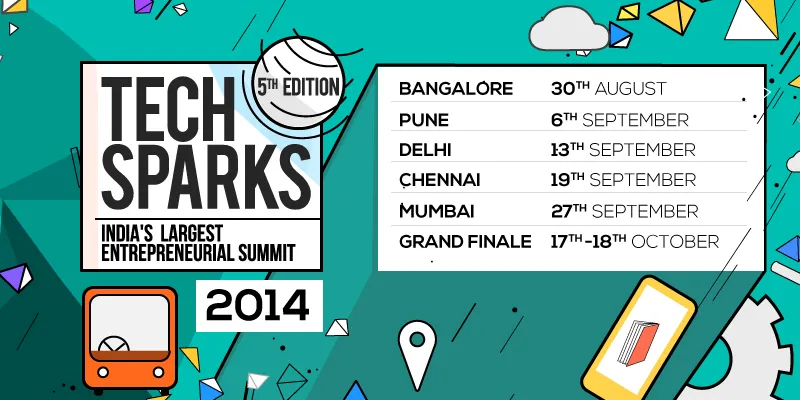
Women of inspiration
TechSparks 2014 kicked off with an inspiring video with messages of women’s empowerment from Anitha Nair, Kiran Bedi, Malathi Holla, Poonam Natarajan, Ambiga Dhiraj and Anu Vaidyanathan. YourStory founder Shradha Sharma welcomed the audience and recalled the journey of TechSparks since its inaugural edition in 2010.
TechSparks celebrates the unrelenting hope of startups shaping India, she said, identifying some of the success stories. For example, former Tech30 startup Little Eye Labs was acquired by Facebook.
Building a Global Business out of India
Nandan Nilekani, Co-founder, Infosys, delivered the opening keynote. “I feel like Rip Van Winkle! The Indian government needs to change and keep up with the startup times,” he joked, referring to the youthfulness and energy of the audience.
“I hope many of you create huge companies! We created Infosys in 1991, before the economic reforms. In 1991, middle class people did not do startups, but we were different,” he recalled. He offered six useful lessons for founders. “Think big, it takes the same energy as thinking small,” he said.
Have a great team, with whom you can spend 10-15 years to build a big successful company. Don’t be constrained by the past, don’t get into ‘things don’t work that way’ mentality. Build a global brand – be unique. Build an institution – it takes hard work, patience and sustainable leadership. Have a mentorship pipeline to groom your employees to go ahead and excel.
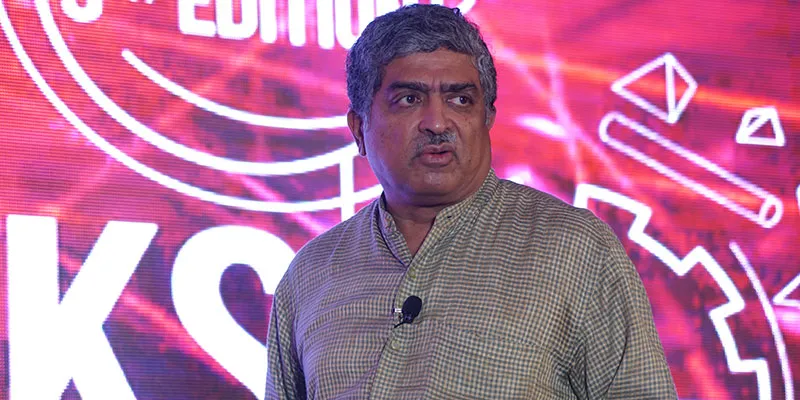
“The time has come for hundreds of companies to go global from India – let’s start with TechSparks,” he said. He provided insights for developers on how to leverage the Aadhar platform, which will soon sign up over a billion Indian citizens. Social applications of ICT can boost local language content as well. “I wish I was younger and could be a startup again,” Nandan concluded.
Category Creators
Shailendra Singh, Managing Director, Sequoia Capital, described the disruptive role of ‘category creators.’ They start off as new ideas which are often misunderstood, but are able to create new market segments and value chains.
A good example is Mu Sigma, which was founded way back in 2004 before terms like Big Data were coined, but rode the wave of analytics and decision sciences. Mu Sigma has as customers 140 of Fortune 500 companies, worth billions of dollars.
PineLabs is another such example; it was founded in 1998, went through some flat years, but crossed the inflection point with the rise of cloud technologies and payment platforms. Many top retailers use PineLabs in India today. USD 7 billion of payment volume is processed on their platform, accounting for 20% of all credit and debit card transactions in India.
“In the next couple of years, 40-50% of all credit transactions in India will be via Pine Labs networks. The redesign of payment systems needs to look at convenience, trust and blended solutions,” explained Lokvir Kapoor, CEO, Pine Labs, in a fireside chat with Shailendra.
Other examples of category creators are JustDial (not just yellow pages), Practo (not just doctor appointments) and Zomato (not just restaurant reviews). “If you are a mutant type of startup, you need to explain yourself to the world,” said Shailendra. Category creation requires patience, persistence, and the willingness to take on the burden of explanation and articulation. Even in traditional industries, there is immense pace of change and disruption, exemplified by companies like Tesla in automotive.
Team Building
Founders of Practo and FreeCharge offered useful tips on team building for startups. Shashank ND of Practo said founders must have clarity in whom they want to hire, and must connect with team members on the company’s vision. “An ex-employee came to thank us for how our product had helped his family,” he recalled. The company has regular hackathons to build competitive spirit along with collaborative attitudes. “Growth is the best form of defence against attrition,” he said.
Building the right culture will attract the right talent, added Alok Goel of FreeCharge. Transparency and consistency are key values, and focus on the problem statement is more important than job titles.
Product Startups
Knowlarity, Vizury, Housing and Intuit shared insights on what it takes to be a successful product company. Choice of market is the key first step – for example, the rise of the Indian economy calls for better financial management solutions for SMEs (Intuit). Understanding the unique conditions of the Indian market spurred the rise of JustDial. Realisation of market opportunity can start as early as the founders’ college years (Housing).
Showing clear customer impacts helps grow the brand, eg. reducing cheque bounce rates (Knowlarity). Technology itself helps scale reach without too many ‘feet on the street,’ eg. online marketing and distribution for Intuit. Innovation can apply to embedded processes as well, eg. data collection via photographs (Housing).
Visibility and Awareness
Ramesh Srivats, Founder of TenTenTen, delivered useful tips for startups to rise above the crowd, with his trademark humour and wit. “I am getting swamped by ads in social media – even for haircare products, though I am bald,” he joked.
“We use brands and talk to people, but social influencers talk to brands and use people,” he said. “We live a digital life. Your product is your message. Your customers are your media. Your employees are your salesmen. You as founders are the brand ambassadors,” he explained. Be yourself, be interesting, and be friendly, he advised as a core social marketing foundation.
The Silicon Valley Magic
Ellen Petry Leanse, a startup mentor who was earlier with Apple and Google, offered a range of tips on what makes Silicon Valley tick – and tick so well. “Silicon Valley was not an overnight occurrence. It was a unique confluence of events,” she said, touching on the local defense industry, academic networks, immigrant talent and the rise of venture capital.
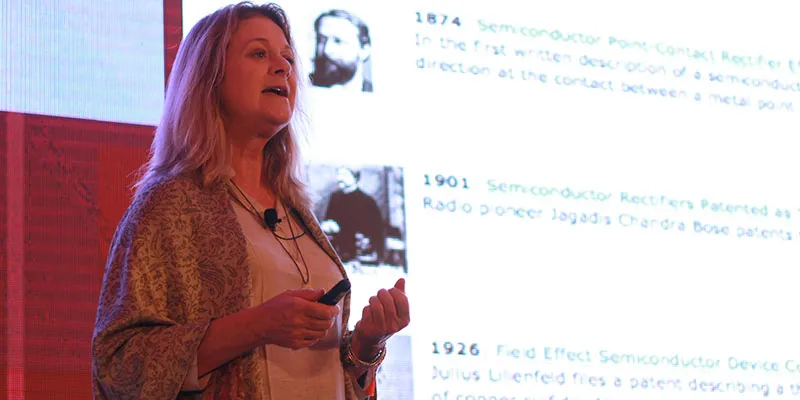
“The goal can’t be only money. Go beyond me-too products and me-too funders,” Ellen advised. Understand the problems as well as you do the solutions. Create new categories, and leverage design thinking. Go beyond ‘STEM’ to ‘STEAM,’ and add arts to the tech mix.
Go beyond the digital world, it is so important to tap the physical world also for creativity. “See the Maker Movement. We need some help staying real,” she said. “If you are staring at Silicon Valley, you are missing the view – it is right here, it is where you are, think local! The next Steve Jobs can come from anywhere in the world,” she concluded.
The Convenience Economy
Bhavish Aggarwal, Founder and CEO, Ola Cabs, addressed the opportunities in the convergence of the ‘sharing economy’ and commuting. “Even my grandmother uses Ola Cabs,” he joked. He recalled his early days when he himself pitched at an earlier edition of TechSparks.
“We work hard to sustain culture despite our fast growth. Competition is good, it has kept us lean,” he said. The toughest part in the journey was the angel round. “I was just a wide-eyed college guy, and faced lots of skepticism with my untested model,” Bhavish said.
“Go ahead and start up, even if your own parents seem skeptical,” he advised aspiring founders. Looking to the future, every business will go mobile, and entrepreneurs should learn how to leverage a mobile-first strategy.
The Content Economy
Edouard Lambelet, Founder of CEO of Paper.li from Switzerland, shared how his startup rode the wave of ‘content circulation.’ Content access today is de-intermediated, nomadic and de-contextualised. There is a lot of energy and engagement of communities around content.
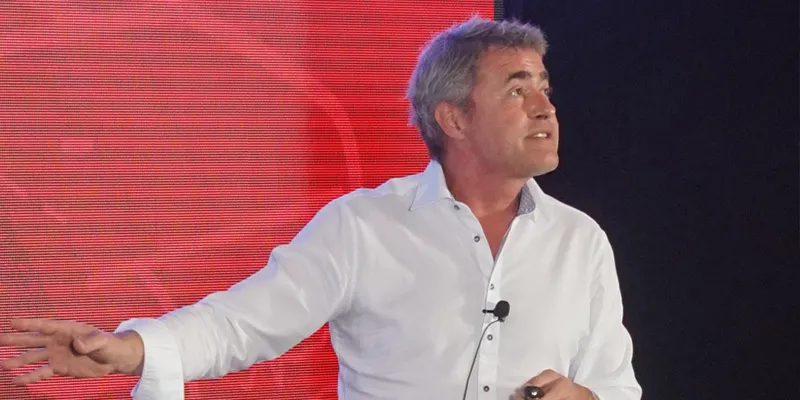
“Our solution was to crowdsource the newsroom,” he said, and allow anyone to curate their own platforms of content as daily or weekly e-magazines. “We harness Big Data to give small data back to millions of users. 20 years ago, a business model like this would have been unthinkable,” Edouard said.
He joked that Switzerland is smaller than Bangalore – but ranks 19th in the world in terms of GDP. 79 per cent of the expat population of Switzerland is in the high-tech sector. “We are small, like Israel, so we have to think global from Day One. Switzerland is not just about cheese and watches, it's about high tech startups too,” he joked.
All things Tech
The importance of tech platforms for scaling was addressed by Sandipan Chattopadhyay, CTO, Justdial, and Bikram Bedi, Head, India for Amazon Internet Services. Lack of resources can lead to competitive advantage through creativity, said Sandipan. “If you have the confidence to go out and face problems, the solution will emerge,” he said. By focusing on the user, the company has seen how to leverage technology for maximum benefit and impact.
Mobile access is still patchy in India, so a key UX (user experience) focus is reducing the amount of time the user waits to get the answer. Amazon’s cloud platform has helped JustDial scale across a wide range of Indian cities.
Southeast Asia, the regional hotspot for global startups
Takeshi Ebihara, Founding General Partner, Redbright Partners, shared some advice for Indian startups expanding overseas. “Look for funds in Singapore, and look for markets across Southeast Asia,” he said. Singapore is regarded as the ‘Wall Street of SoutheastAsia.’
Similarities between the regions include the popularity of digital ads in Indonesia and mobile in Thailand. “Go only if you have traction here and want to scale. Find the right partner, and learn by doing,” Takeshi said.
The rise of Xiaomi
Manu Jain, Head of India operations for Xiaomi, showed how the Chinese smartphone player is innovating on both product and process fronts. “Our marketing spend is zero,” he said. A success factor has been the huge buzz via word of mouth from lots of fans.
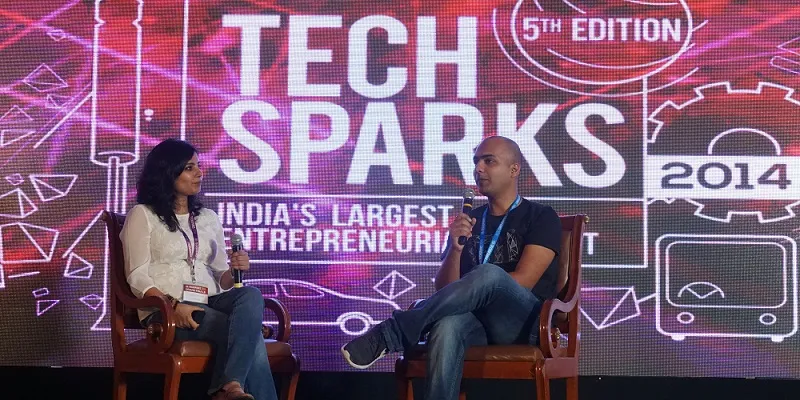
“We are setting up an R&D centre in India also, in addition to China. We set a basic target of 10,000 handset sales per week, but we crossed 100,000 per week,” he said. “We focused on understanding customers and engaging fans. We have regular fan meets in our office. Our service chief used to head a salon, we want to replicate that experience in our service centres,” said Manu.
Xiaomi’s strategy is to compete with highest-end phones but at 40% of the cost. “We started off as a software company, then became a direct seller of phones,” he said.
Rise of IoT
Dr. Jay Warrior, Chief Technologist, Robert Bosch Centre for Cyber Physical Systems, IISc Bangalore, shared examples of data-driven agri products for farmers to help plan and scale their produce. IoT is better understood as ‘IoPT’ - Internet of People and Things, as people themselves become mobile sensors, Jay said.
Sensor costs have to come down to the level of Rs. 50-100 each to really afford scale and opportunity. “We need to factor in offline operations along with inter-operable ecosystems and security,” he cautioned. Big Data can be leveraged with the ‘small data’ of individual users.
Challenges arise in complex event processing, model-driven analytics, and policy implications. Quantified health, optimised machinery, and coopetitive ecosystems are emerging use-case scenarios, said Jay.
Women in Tech
Kumud Srinivasan, President, Intel India, pointed out that 50% of college engineering students in India are women, more than in the US. “What helped me in the tech world are persistence, prioritisation, tradeoffs and mentors,” she recalled.
“Guilt is the curse of womanhood, don’t feel guilty about your career choices,” she advised women entrepreneurs. Men should become part of the dialogue too, Kumud said. These are exciting years ahead as the tech boom continues and it impacts all manner of business around us, providing opportunity for everyone.
Technology M&A in India
Klaas Oskam, Managing Director, Signal Hill, said that in the ten years that he has spent in India, he has seen more massive change now than before. “There is a shift away from IT services to Internet and software based businesses,” he said, which will trigger a new wave of investments and exits.
“VC and PE investors are betting that India will start producing billion-plus dollar exits in the next two-five years,” he said. However, the Indian Internet and software sector has a long way to go to catch up with the US and Israel.
Challenges for Indian startups are lack of business readiness, nascent local buyer universe, and the discovery problem. Indian companies going international need global accounting and governance practices, and should show traction overseas. He pointed to AliBaba as a good example of a rising star from China.
Other speakers such as Ravi Venkatesan, former Chairman, Microsoft India, urged founders to deeply introspect on their sense of purpose, team composition, choice of mentor, tenacity and gratitude to their colleagues. A panel on mobile payments showed how mobile wallets open the door to a range of value-added services, such as protection against cancellation of orders.
Five founders also pitched during the Startup Launchpad for new players, including Tlkn.com, Flatchat, Zen and MotionCart. Comedian Praveen Kumar (‘Funny Leone’) regaled the audience with a rapid series of one-liners and witty observations, and Arunabh Kumar, Founder & Group CEO, TheViralFever Media Labs, shared his journey in the world of social media growth hacking.
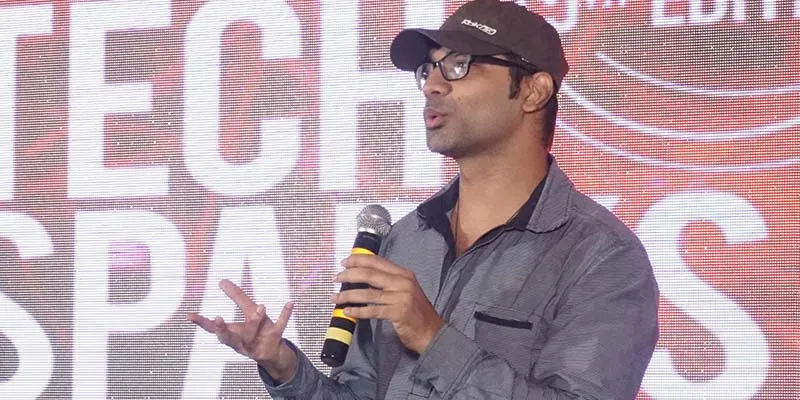
Insights into the app world (‘apponomics') were discussed by TrueCaller, Line, Newshunt and Octro. Virality is not always predictable, but it helps if there is an emotional connect with users which can then be channeled onto social media. The Top Seven newspapers in India are non-English, and India has only 10% English literacy – there is an emerging boom in digital content in Indian languages.
Arvinder Gujral, Head of Business Development for India and Southeast Asia at Twitter, urged startups to stand out by being unique and developing a branded presence across all touch points. He cited the example of DollarShaveClub.com as a great example of guerilla marketing by an upstart in the razor industry dominated by Gillette. Closing remarks were made by Mamatha Gowda, Joint Director of Information Department, Govt. of Karnataka.
The celebration and euphoria carried on long and late as the audience congratulated the Tech30 stars. Join us for the TechSparks 2015 conference and showcase this week, as we plunge into the new wave of startups and crown the next 30 startup leaders from India!
A big shoutout to TechSparks 2015 sponsors – Sequoia Capital, ICICI Bank, Money on Mobile, Microsoft, Signal Hill, IBM Bluemix, PwC, Atom Tech, Teamchat, Govt. of Karnataka, Intel, Rabbler, Dailyhunt, Reverie, Loginext and PayUBiz; Partners – Duff&Phelps, Taxmantra, Dineout, Exotel, 360ride, Yoga Bar, Chai Point, GWC; and our Media Partners – TV9, Fortune India, RedFM and Deccan Herald.







